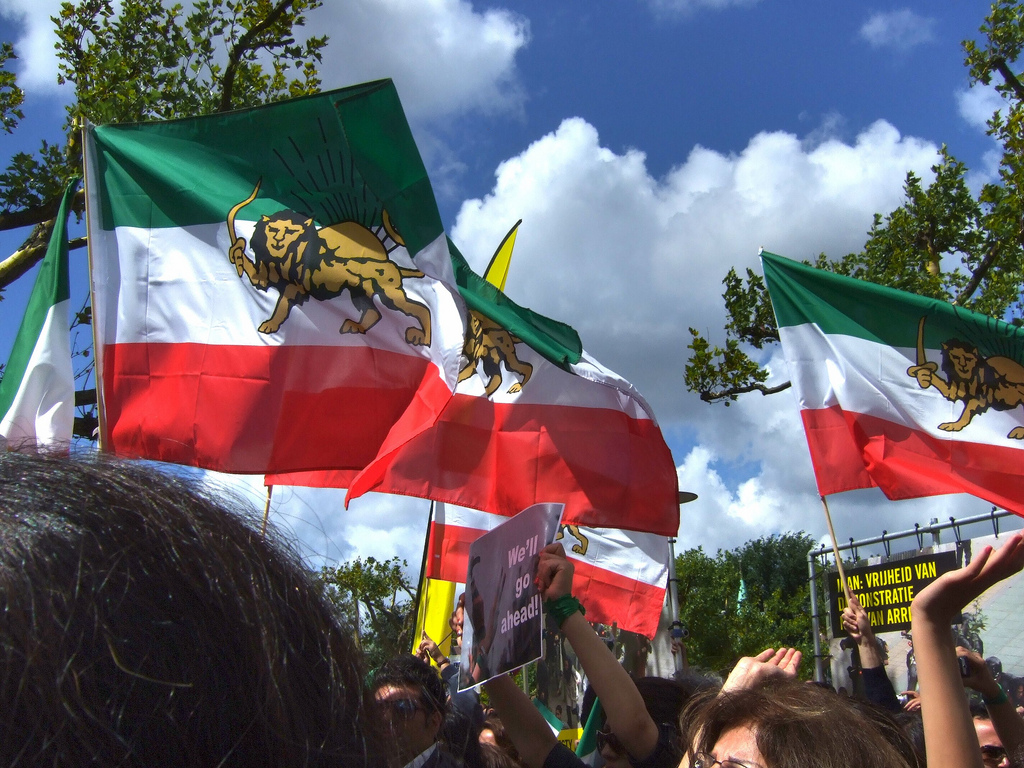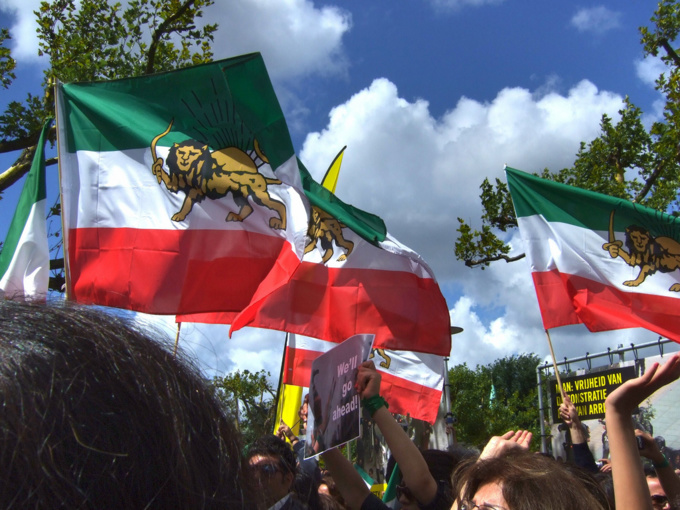International oil companies are slow to invest in Iran, as the administration of President Donald Trump threatens to cancel the deal in 2016 and introduce sanctions that were once canceled in exchange for limiting the atomic program of the Islamic Republic once again.
The Iranian leadership expected that the nuclear deal would lead to an inflow of foreign investments into the oil and gas sector of the country in the amount of $ 10 billion per year. However, over the past two years, these investments amounted to only about $ 1.3 billion, mainly from China, says Homayoun Falakshahi, an analyst at Wood Mackenzie on Iran.
After the initial growth, Iran's oil production capacity leveled off at 3.85 million barrels per day, according to the International Energy Agency, and this figure is much lower than the estimates given by the Iranian leadership in recent years. On the day that Donald Trump was elected president of the United States, French Total SA signed an agreement with Iran for $ 1 billion, and this was perceived as a forerunner of further major investments by Western countries. However, there were no new deals afterwards.
French automaker Peugeot and American aircraft manufacturer Boeing Co. found ways to conclude agreements with Iran. Yet, the oil and gas industry cannot boast with long-term and big enough investments. In Iran itself, supporters of a tough foreign policy line criticize President Hassan Rouhani for plans to provide foreign oil companies with more attractive working conditions.
Recently, Tehran hosted a conference where the high potential of the national energy industry was to be demonstrated. According to informed sources, British BP PLC, French EDF Group and German Wintershall AG sent representatives to the meeting.
However, these companies and their subdivisions were slow to make decisions. They are conducting operations in the US, which may be affected if sanctions are renewed, the sources say.
A representative of one of the Italian oil companies, which has been trying to conclude a deal with Iran for several years, called the situation "depressing."
BP declined to comment, and the EDF did not respond to the request. Wintershall informed that they "closely monitor the changes" in Iran and strictly follow the law.
Experts believed that the restoration of Iran's oil industry after nearly a decade of sanctions that limited oil exports would be the easiest thing in the entire economy. Iran has the world's fourth largest oil reserves and the world's largest natural gas reserves, most of which are just to be removed. Large oil companies such as BP have worked in Iran for a long time, have extensive experience in extracting oil from hard-to-recover reserves and now want to resume operations under new conditions.
Iran's representatives confirmed that foreign investments are entering the country more slowly than expected, accusing the US of provoking fears and uncertainties.
"I am not satisfied with the current state of affairs," Iranian oil minister Bijan Namdar Zangeneh said in an interview. "However, we do not give up trying, and I am optimistic about the future," he added.
Trump is expected to review the terms of the Iranian deal before May 12, or resume sanctions against Iranian oil. A spokesman for the US State Department said that the United States was in compliance with the terms of the deal and expected the same from Iran.
The United States is also concerned that Iran, among other things, supports such groups as Hezbollah and the ballistic missiles they use.
Overall, the situation in the economy of Iran has improved after the lifting of sanctions. So, oil exports grew by almost one million barrels a day, and investments from China increased. Oil exports helped to restart the growth of the Iranian economy and weaken high inflation.
However, the sluggish economic recovery also intensified frustration among the Iranian population. Economic problems became the main reason for large-scale protests at the beginning of the year, which resulted in direct statements against the Iranian authorities.
The International Monetary Fund (IMF) predicts that Iran's GDP growth in the current fiscal year will slow to 4.2% from 6.6% last year amid a continued oil recovery and uncertainty over the nuclear deal. The rate of the Iranian Rial, meanwhile, is fluctuating greatly.
According to Zangeneh, in the near future he expects to conclude deals with foreign oil companies, and Russian media reported that oil companies from Russia plan to invest in Iran. Some western companies, including Baker Hughes GE, are trying to conclude deals with Iran. According to some sources, the company is trying to find a way to supply equipment and services for Total gas projects in Iran without involving American employees.
A spokesman for Baker Hughes said that "the commercial interaction (of this company) with Iran meets all the requirements and does not contradict the normative acts, licenses and rules established in the United States."
At the moment, all dollar transactions with Iran are still blocked. This complicates the situation, as oil trades for dollars. Large banks are reluctant to finance agreements concluded with Iran.
According to informed sources, Total has assembled a group of little-known Chinese, French and Italian banks to transfer money to its project, aimed at increasing production at the largest offshore gas field in Iran.
Total said that the project "is going according to plan," and the contract with banks was concluded in accordance with all laws.
Iranian supporters of a tough foreign policy line are struggling to limit the investment of foreign companies, such as Total, in the extraction of natural gas. Natural gas in Iran is of less political importance, because it is not exported in such large quantities as oil.
Nevertheless, last month Iran, under the influence of the supporters of tough foreign policy, canceled the preliminary agreement on the construction of the first sea export terminal for the transportation of liquefied gas, concluded with the Norwegian company.
source: wsj.com
The Iranian leadership expected that the nuclear deal would lead to an inflow of foreign investments into the oil and gas sector of the country in the amount of $ 10 billion per year. However, over the past two years, these investments amounted to only about $ 1.3 billion, mainly from China, says Homayoun Falakshahi, an analyst at Wood Mackenzie on Iran.
After the initial growth, Iran's oil production capacity leveled off at 3.85 million barrels per day, according to the International Energy Agency, and this figure is much lower than the estimates given by the Iranian leadership in recent years. On the day that Donald Trump was elected president of the United States, French Total SA signed an agreement with Iran for $ 1 billion, and this was perceived as a forerunner of further major investments by Western countries. However, there were no new deals afterwards.
French automaker Peugeot and American aircraft manufacturer Boeing Co. found ways to conclude agreements with Iran. Yet, the oil and gas industry cannot boast with long-term and big enough investments. In Iran itself, supporters of a tough foreign policy line criticize President Hassan Rouhani for plans to provide foreign oil companies with more attractive working conditions.
Recently, Tehran hosted a conference where the high potential of the national energy industry was to be demonstrated. According to informed sources, British BP PLC, French EDF Group and German Wintershall AG sent representatives to the meeting.
However, these companies and their subdivisions were slow to make decisions. They are conducting operations in the US, which may be affected if sanctions are renewed, the sources say.
A representative of one of the Italian oil companies, which has been trying to conclude a deal with Iran for several years, called the situation "depressing."
BP declined to comment, and the EDF did not respond to the request. Wintershall informed that they "closely monitor the changes" in Iran and strictly follow the law.
Experts believed that the restoration of Iran's oil industry after nearly a decade of sanctions that limited oil exports would be the easiest thing in the entire economy. Iran has the world's fourth largest oil reserves and the world's largest natural gas reserves, most of which are just to be removed. Large oil companies such as BP have worked in Iran for a long time, have extensive experience in extracting oil from hard-to-recover reserves and now want to resume operations under new conditions.
Iran's representatives confirmed that foreign investments are entering the country more slowly than expected, accusing the US of provoking fears and uncertainties.
"I am not satisfied with the current state of affairs," Iranian oil minister Bijan Namdar Zangeneh said in an interview. "However, we do not give up trying, and I am optimistic about the future," he added.
Trump is expected to review the terms of the Iranian deal before May 12, or resume sanctions against Iranian oil. A spokesman for the US State Department said that the United States was in compliance with the terms of the deal and expected the same from Iran.
The United States is also concerned that Iran, among other things, supports such groups as Hezbollah and the ballistic missiles they use.
Overall, the situation in the economy of Iran has improved after the lifting of sanctions. So, oil exports grew by almost one million barrels a day, and investments from China increased. Oil exports helped to restart the growth of the Iranian economy and weaken high inflation.
However, the sluggish economic recovery also intensified frustration among the Iranian population. Economic problems became the main reason for large-scale protests at the beginning of the year, which resulted in direct statements against the Iranian authorities.
The International Monetary Fund (IMF) predicts that Iran's GDP growth in the current fiscal year will slow to 4.2% from 6.6% last year amid a continued oil recovery and uncertainty over the nuclear deal. The rate of the Iranian Rial, meanwhile, is fluctuating greatly.
According to Zangeneh, in the near future he expects to conclude deals with foreign oil companies, and Russian media reported that oil companies from Russia plan to invest in Iran. Some western companies, including Baker Hughes GE, are trying to conclude deals with Iran. According to some sources, the company is trying to find a way to supply equipment and services for Total gas projects in Iran without involving American employees.
A spokesman for Baker Hughes said that "the commercial interaction (of this company) with Iran meets all the requirements and does not contradict the normative acts, licenses and rules established in the United States."
At the moment, all dollar transactions with Iran are still blocked. This complicates the situation, as oil trades for dollars. Large banks are reluctant to finance agreements concluded with Iran.
According to informed sources, Total has assembled a group of little-known Chinese, French and Italian banks to transfer money to its project, aimed at increasing production at the largest offshore gas field in Iran.
Total said that the project "is going according to plan," and the contract with banks was concluded in accordance with all laws.
Iranian supporters of a tough foreign policy line are struggling to limit the investment of foreign companies, such as Total, in the extraction of natural gas. Natural gas in Iran is of less political importance, because it is not exported in such large quantities as oil.
Nevertheless, last month Iran, under the influence of the supporters of tough foreign policy, canceled the preliminary agreement on the construction of the first sea export terminal for the transportation of liquefied gas, concluded with the Norwegian company.
source: wsj.com



















